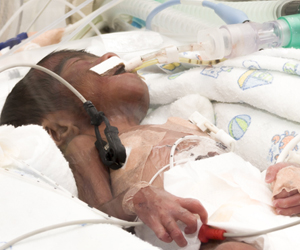Q: Which doctor treats Bronchopulmonary Dysplasia?
A: A neonatologist (doctor who cares for the newborn) trained in the management of acutely ill babies manages BPD along with a team of health professionals including a pediatric lung specialist, nurses, dietitian and social worker.
Q: How long will my baby need to stay in hospital?
A: The duration varies according to degree of prematurity and severity of disease. A Kids Health report recently estimates that the average NICU stay for babies with BPD is 120 days.
Q: How common is Bronchopulmonary Dysplasia?
A: BPD is a common complication of preterm birth. Studies in the US and Europe report widely variable figures in different centers between 17% and 57%
Q: Can Bronchopulmonary Dysplasia be prevented?
A: BPD is a complex condition and prevention should target risk factors such as prematurity and low birth weight as well as early diagnosis and treatment of antenatal and postnatal sepsis, optimal ventilator support and oxygenation, maintenance of fluid/electrolyte status, and early parenteral (intravenous feeding)/enteral nutrition (tube feeding).
Q: Is Bronchopulmonary Dysplasia a Fatal Condition?
A: With improved neonatal care facilities, survival of preterm infants born at 28 weeks and more has vastly improved. Mortality rates of infants born at less than 24 weeks gestation remain high.
Q: What are the Complications of BPD?
A: Complications of BPD include frequent respiratory infections, development of asthma, delayed growth and development, poor exercise tolerance, pulmonary hypertension and right heart failure (cor pulmonale).
Q: What is the longterm outlook for infants with BPD?
A: It is again variable. Infants with mild to moderate BPD outgrow their condition by 3 to 5 years of age and develop normally. However, they may be at increased risk of infections and develop asthma later. Infants with moderate to severe BPD who survive may show delayed milestones including motor impairment and language delay. They may need frequent hospital admissions and remain oxygen dependent for the first two years.
Q: How do I ensure that my baby is protected from recurrent infections after discharge?
A: Prevention of infections is key to caring for babies with BPD. Measures include maintaining hygiene by regular hand washing, avoiding contact of baby with infected persons, avoiding exposure to smoke and other pollutants, immunization of family members with flu vaccine, protecting baby against RSV infections with monthly antibody shots.









